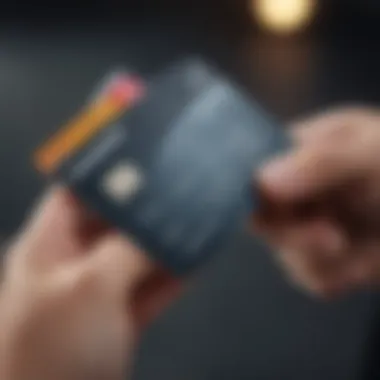Understanding the Implications of Closing a Credit Card with a Balance


Intro
Closing a credit card account while still having a balance can be a tricky situation. It requires understanding the implications that this decision may carry, particularly regarding your credit score. Many people do not realize the effects closing a card will have in terms of their overall financial health. This article aims to clarify the complexities surrounding this process and provide you with the tools and knowledge to make informed decisions.
Understanding Credit Scores
What is a Credit Score?
A credit score is a numerical representation of an individual's creditworthiness. It measures how likely a person is to repay borrowed money, which lenders evaluate before extending credit. Scores typically range from 300 to 850, with higher numbers indicating better credit.
Importance of Credit Scores
Credit scores play a crucial role in financial decisions. Lenders use them to determine loan approvals, interest rates, and credit limits. They can affect not only your ability to borrow but also the terms of any loans you are offered. A higher score usually means lower borrowing costs.
How Credit Scores are Calculated
Credit scores are calculated using several factors, including:
- Payment history: This is the most influential factor. Making payments on time boosts your score.
- Credit utilization: This refers to how much of your total credit limit you are using.
- Length of credit history: Longer histories can positively affect your score.
- Types of credit accounts: Having a mix of credit can be beneficial.
- Recent credit inquiries: Too many inquiries in a short time can lower your score.
Common Myths About Credit Scores
There are various misconceptions about credit scores.
- Myth: Checking your credit score harms it.
- Fact: Self-checks do not affect your score.
- Myth: Closing old accounts improves your score.
- Fact: Older accounts contribute positively; closing them can harm your score.
Factors Affecting Your Credit Status
Payment History
Timely payments are critical. Late or missed payments remain on your credit record for several years and significantly impact your credit score. It is advisable to always prioritize debt obligations to maintain a good score.
Credit Utilization Ratio
This ratio represents the percentage of available credit you are using. A lower percentage is generally better. Ideally, you should aim to keep it below 30%. Closing a credit card can increase your utilization if the balance remains unpaid.
Length of Credit History
A longer credit history is viewed favorably. When you close a card, the history related to that account may be lost, which can result in a stricter credit evaluation.
Types of Credit Accounts
A mix of credit types can boost your score. Having installment loans, such as car loans or mortgages, alongside revolving credit such as credit cards, is generally more advantageous than having only one type.
Recent Credit Inquiries
Multiple recent inquiries indicate potential risk to lenders. Closing a card and simultaneously seeking new credit can trigger inquiries, which may further damage your score.
Strategies for Improving Your Credit
Top Tips for Raising Your Score
- Pay down existing balances
- Make payments on time consistently
- Avoid taking on unnecessary debt
- Keep old accounts open to maintain credit history
Debt Management Techniques
Consider setting a budget. Track your expenses to ensure you can manage debts. Consult financial advisors if needed.
Importance of Regular Credit Report Checks
Regularly check your credit report for errors. It helps you understand your score and identify areas for improvement. Misreported information can unfairly lower your score. Visit AnnualCreditReport.com for a free report.


How to Deal with Negative Items on Your Report
If you find negative items, you may dispute them. Provide evidence to support your claim. It's essential to follow up until the issue is resolved.
Personalized Recommendations for Financial Products
Overview of Recommended Credit Cards
Finding the right credit card depends on your financial habits. Research various options that cater to your spending behaviors, such as cash back, travel rewards, or lower interest cards.
Best Loans for Different Financial Situations
Assess your needs carefully. Personal loans are versatile, while auto loans and home loans serve specific purposes. Choose what suits your situation best.
How to Choose the Right Financial Product
Match products to your financial goals. Understand the terms and fees involved. Read reviews and compare options before making a commitment.
Tools for Comparing Offers
Utilize online comparison tools. They provide a broad view of different products available. Websites like Bankrate and NerdWallet can be helpful.
Tax Preparation and Filing Insights
Importance of Tax Compliance for Credit
Timely tax payments keep your credit profile healthy. Unpaid taxes can lead to liens which negatively impact credit scores.
Tips for Efficient Tax Preparation
Start early. Gather all documentation and receipts. Use software if needed. Consider consulting with a tax professional to maximize your deductions.
Understanding Deductions and Credits
Learn about available deductions and credits. They can reduce taxable income. This enhances your overall financial health.
Common Tax Mistakes to Avoid
Avoid filing late. Miscalculating deductions can be costly. Failing to report income can lead to penalties.
Understanding Credit Card Balances
Understanding credit card balances is essential for anyone navigating personal finance. It sets the groundwork for comprehending how credit card debt functions, what implications it has when deciding to close an account, and how to manage it smartly. Knowing the various facets of credit card balances, such as definitions and types, allows consumers to make informed decisions regarding their accounts.
Definition of Credit Card Balance
A credit card balance is the amount owed on a credit card at any given time. It represents what you have charged to the card, including purchases and any applicable fees, minus the payments you have made. Maintaining awareness of this balance is crucial. If it is not managed properly, your credit utilization ratio can suffer, adversely impacting your credit score.
Types of Balances
Credit card balances can be classified mainly into two types: revolving balance and payment due balance. Understanding these types helps in strategizing payment plans and deciding on the relevance of closing a card with an outstanding balance.
Revolving Balance
The revolving balance involves any amount carried over from one billing cycle to another. This type of balance is a critical aspect of credit usage. It affects your credit utilization ratio, which is one of the key components in credit scoring.
The main characteristic of revolving balances is their fluidity; they can fluctuate month-to-month based on your spending and payment behavior. This flexibility can be advantageous in certain financial situations. However, if not paid off quickly, interest rates can accumulate, leading to substantial debt over time. By carefully managing a revolving balance, consumers may improve their credit status and utilize credit more effectively.
Payment Due Balance
The payment due balance, on the other hand, refers to the specific amount required to avoid late fees and additional interest charges during the current billing cycle. It includes any new purchases made since the last statement period, as well as any previous balance due. This type of balance is vital for those looking to maintain a positive standing with their credit card issuer.
One key characteristic of payment due balance is its immediacy. If paid on time, it prevents negative influences on your credit score. However, if one does not manage payments effectively, it can lead to increased financial stress. Understanding this balance type can assist consumers in maintaining better financial health and informed credit decisions.


Implications of Closing a Credit Card
When considering whether to close a credit card, it is crucial to understand the implications. Closing a card with an outstanding balance can have significant effects on your financial health. Notably, it can influence your credit score, which is a critical factor for future borrowing.
Effects on Credit Score
Impact of Credit Utilization Ratio
One major aspect of your credit score is the credit utilization ratio. This ratio measures how much of your available credit you are currently using. Ideally, you want to keep this ratio below 30%. When you close a credit card account, the total amount of credit available to you decreases. This decrease can lead to a higher credit utilization ratio, which may negatively impact your credit score. A higher ratio shows lenders that you are relying heavily on credit, which can be seen as a risk. Hence, paying down the balance before closing the account is often a wise move.
Length of Credit History
Your credit history length is another essential factor in determining your credit score. Credit scoring models typically favor individuals with longer credit histories. Closing an old credit card can reduce your average account age. If it is one of the older accounts in your portfolio, its closure might shorten your credit history, leading to a potential score drop. Maintaining a diversified credit mix is beneficial, but closing accounts can disrupt this balance.
Potential Fees and Charges
Additionally, closing a credit card might trigger certain fees or charges. While it is common to think of credit cards as free, some issuers may impose early closure fees or balance payment penalties. Before closing your card, it is wise to contact your card issuer to ask about any potential costs. Understanding these factors can prevent unexpected fees and help you make a more informed decision about your finances.
It is important to analyze not just the immediate effects but the long-term consequences of closing a credit card with a balance. Each factor plays a component in your overall credit profile.
Steps to Close a Credit Card with a Balance
When considering the closure of a credit card account that still has a balance, the process may appear straightforward but is layered with procedural and financial nuances. Properly navigating these steps is crucial to avoid adverse effects on your financial health, particularly your credit score. Each step offers benefits that can help in managing your credit responsibly while transitioning away from a credit account.
Assessing Your Current Financial Situation
Before proceeding with closing a credit card, it is essential to fully assess your financial situation. This assessment involves taking stock of your current income, expenses, and outstanding debts.
Start by calculating your overall debt-to-income ratio. This metric will help you understand how much of your income is tied up in debt, impacting your ability to pay off existing balances. Also, consider your credit utilization ratio and how the closure of an account might affect it. A high ratio can negatively impact your credit score, so being aware of this is critical before making any decisions.
Paying Down the Balance
When juggling a credit card closure with an outstanding balance, managing that balance is paramount. Paying down the balance before closing can mitigate negative impacts on credit and financial stability.
Debt Repayment Strategies
Debt repayment strategies are vital in the context of closing a credit card with a balance. These strategies typically involve methods like the snowball or avalanche techniques. The snowball method focuses on paying off smaller debts first to build momentum, while the avalanche method prioritizes higher interest debts to save on interest over time. Each strategy has its characteristic approach:
- Snowball method builds psychological momentum, motivating timely repayments.
- Avalanche method minimizes total interest payment, potentially resulting in quicker debt elimination.
These strategies offer efficiency in reducing debt and can be tailored to individual circumstances, making them beneficial choices for managing credit card balances effectively.
Negotiating with Creditors
Negotiating with creditors is another critical method when addressing outstanding balances. If you cannot pay the balance in full, you might consider contacting the credit card issuer to discuss possible payment plans or settlements. This process often involves how to:
- Request a lower interest rate if you have a good repayment history.
- Ask for a settlement, sometimes allowing you to pay less than the total owed.
This strategy highlights the flexibility creditors may offer and the opportunities for individuals to ease financial burdens. However, it is crucial to remain aware of potential impacts on credit scores that these negotiations may entail.
Contacting the Credit Card Issuer
After you complete the necessary preparations, contacting the credit card issuer is the next step. It is critical to have all relevant information ready, including account numbers and any pertinent payment history. During this communication, convey your intent clearly to close the account and ensure there are no pending charges that may arise post-closure. Many issuers will guide you through the steps needed to finalize the account’s closure, which might include confirming your balance, payment timeline, and ensuring that the creditor will report the closure accurately to credit bureaus.
By approaching the closure of a credit card with a balance thoughtfully, you can navigate the complexities involved and maintain control over your financial future.
After Closing the Credit Card
Closing a credit card is just one part of the process. What comes next is equally important. After you close a credit card, understanding how to manage your credit report and knowing the long-term effects on your credit score is crucial. This ensures that you do not face unexpected issues later. Monitoring your credit report becomes a key practice. It allows you to see how closing the account affects your overall credit profile. Additionally, understanding the nuances of credit score changes over time can help you stay informed about how your financial decisions impact your borrowing power.
Monitoring Your Credit Report
Once you close your credit card, monitoring your credit report should be a priority. The credit reporting agencies update your accounts regularly, but this may take some time after closure. Here are some reasons to keep an eye on your report:


- Accuracy of Information: Ensure that the credit card account is reported as closed. Any discrepancies can lead to confusion or a drop in your credit score.
- Detecting Fraud: Regular monitoring can help you spot unauthorized accounts or transactions early. This is vital for maintaining financial security.
- Understanding Changes: By observing your credit report, you can see how closing the credit card affects your credit utilization rate and overall credit score.
To access your credit report, you can use services from Experian, Equifax, or TransUnion. They often provide free annual reports, enabling you to stay informed.
Understanding the Impact on Credit Score Over Time
The act of closing a credit card does not immediately erase the effects on your credit score. Understanding the impact over time offers insight into how your financial history is affected:
- Short-term Effects: Initially, closing a credit card may lower your credit score. This occurs due to a rise in your credit utilization ratio if you have outstanding balances on other cards.
- Long-term Outcomes: Over time, the impact of closing the card may diminish. If you manage your other credit lines responsibly, your score can recover and even improve.
- Credit History: Closed accounts remain on your credit report for a duration of up to 10 years. This means the account can still factor into the length of your credit history, which is beneficial for your score.
It is important to have a healthy credit mix and maintain low utilization rates across all active accounts.
Ultimately, the responsibility falls on you to keep track of your credit report. This awareness can guide you toward better credit decisions in the future. By managing your credit wisely after closing an account, you can achieve lasting financial health.
Recommendations for Future Credit Management
Managing credit effectively is a crucial skill for anyone navigating financial landscapes. Proper credit management is not just about handling existing debt but also planning for the future. This section emphasizes the importance of building a robust credit profile and utilizing credit in a responsible way. By focusing on these elements, individuals can safeguard their financial health and enhance their opportunities for credit in the future.
Building a Stronger Credit Profile
A stronger credit profile is the foundation of good credit management. It reflects your creditworthiness and influences access to loans, credit cards, and favorable interest rates. Here are several key elements to consider for strengthening your credit profile:
- Timely Payments: Always make payments on or before the due date. Late payments negatively impact your credit score.
- Credit Utilization Ratio: Keep this ratio below 30%. High utilization can be perceived as financial distress, thus lowering your score.
- Diverse Credit Mix: Having different types of credit accounts, such as revolving credit cards and installment loans, can benefit your score.
- Regularly Review Your Credit Reports: Check for inaccuracies or fraudulent activity. Disputing errors can lead to a boost in your score.
Investing time in these practices doesn't just improve your score, it also provides a more positive relationship with creditors. A better profile opens doors to advantageous financial products.
Utilizing Credit Responsibly
Utilizing credit responsibly requires discipline and awareness. It involves understanding your financial limits and the consequences of overspending. Below are some considerations for responsible credit use:
- Set a Budget: Establish a monthly budget that accounts for your income and expenses. This helps in tracking spending and avoiding debt.
- Limit New Credit Applications: Each application can lead to a hard inquiry on your credit report, which may momentarily dip your score. Only apply when necessary.
- Pay More Than the Minimum: Try to pay off more than the minimum required amount on credit cards. This approach minimizes interest and reduces debt faster.
- Emergency Fund: Maintain an emergency fund to avoid relying on credit during unexpected situations.
Legal Considerations
When dealing with credit cards, especially when closing them with an existing balance, understanding the legal considerations is crucial. This awareness helps consumers navigate the complexities of credit card agreements and their rights, ensuring informed decisions about their financial health.
Understanding Your Rights
Every credit card holder has rights protected by laws in place. Knowing these is essential for both current and future financial dealings. For instance, cardholders have the right to receive clear information about fees, interest rates, and changes to their account terms.
When you consider closing a credit card, be sure you understand:
- Your Right to Information: Companies must disclose policies associated with cancelling accounts. This includes any outstanding balances and how they affect your credit score.
- Dispute Process: If there are discrepancies with your account or unrecognized charges, the law gives you the right to dispute these issues. This process can help resolve problems without incurring further harm to your financial standing.
- The Right to Fair Treatment: Creditors cannot unfairly harm your credit report based on closure or payment circumstances.
It's wise to request a copy of your contract to review the specific terms of closure. Knowing your rights can help you avoid pitfalls when managing your credit.
Consumer Protection Laws
Consumer protection laws are designed to safeguard you in various facets of financial transactions, including credit card closures. These laws vary by country, but their core concepts remain similar.
Key Elements of Consumer Protection Laws:
- Truth in Lending Act (TILA): This law mandates that lenders disclose terms and costs associated with credit cards. It helps ensure you are fully informed before making decisions about your account.
- Fair Credit Reporting Act (FCRA): This act regulates how credit reporting agencies handle your data. It ensures that your credit information is accurate and provides a way to correct any errors.
- Fair Debt Collection Practices Act (FDCPA): This law protects consumers from abusive debt collection methods, which can occur after closing a credit card with a balance. It imposes strict rules to guide creditors on how to communicate with you.
Understanding these laws can be a major asset for anyone looking to close a credit card while carrying a balance. They not only inform you of your rights but also provide resources should you need to resolve issues with creditors or collection agencies.
The protection of consumer rights is fundamental when closing a credit card. It is essential to be aware of the laws that apply to your situation for a smoother transition.
By knowing your legal rights and the consumer protection laws relevant to credit cards, you equip yourself to make better financial decisions and avoid unforeseen complications. This knowledge is invaluable when closing a credit card while maintaining a balance.
Finale
Closing a credit card with an outstanding balance is a multifaceted situation that requires a solid understanding of the implications involved. This article emphasizes the importance of strategically managing credit rather than relying on a snap decision.
Summary of Key Points
Closing a credit card can influence an individual's credit score in various ways. Key points to recall include:
- Credit Utilization Ratio: A closed account factors into this calculation, highlighting the balance versus credit limit issue.
- Length of Credit History: Closing an older credit card can reduce the average age of your accounts. This element is vital since a longer credit history is typically favorable.
- Legislation: The article discusses consumer protection laws that apply when closing an account. Understanding your rights can prevent unfavorable outcomes.
- Future Management: Suggestions include building a strong credit profile and utilizing credit responsibly after closure. This can help mitigate any negative effects caused by closing the account.







